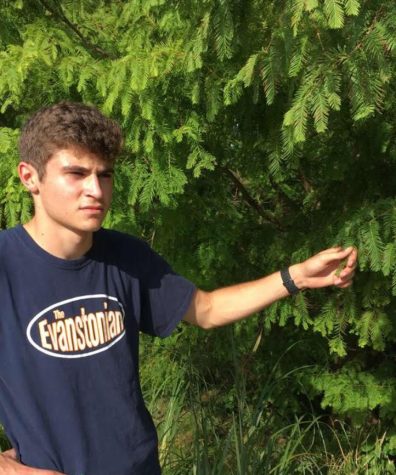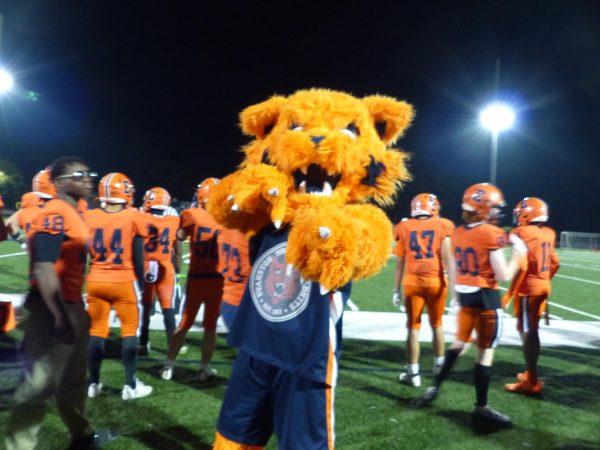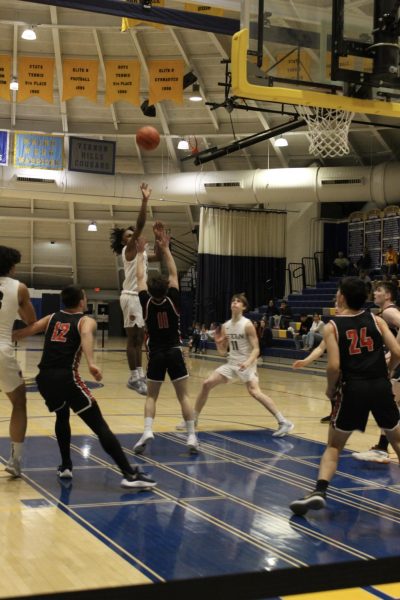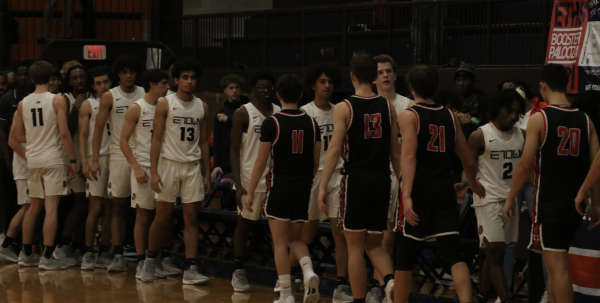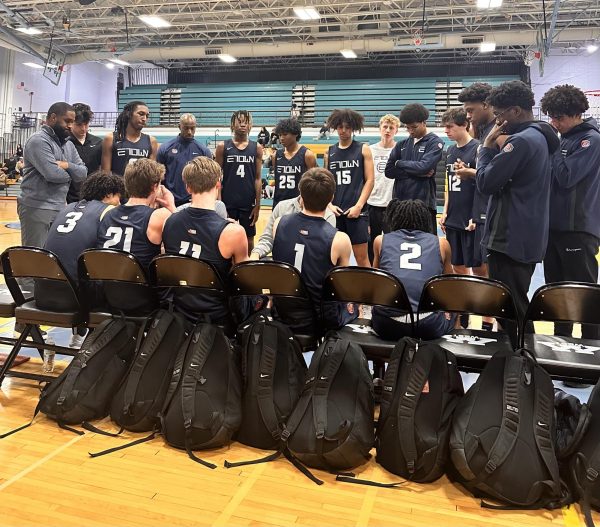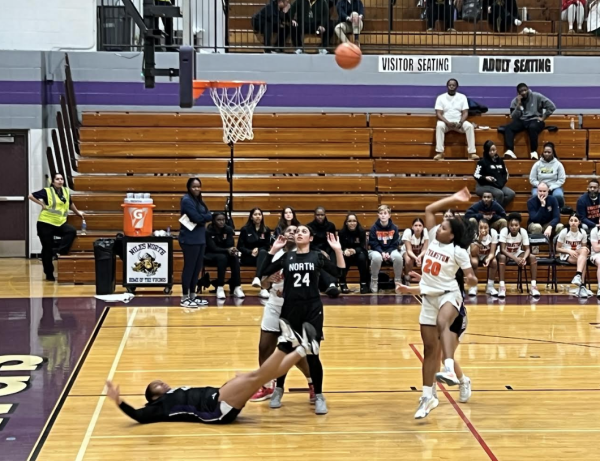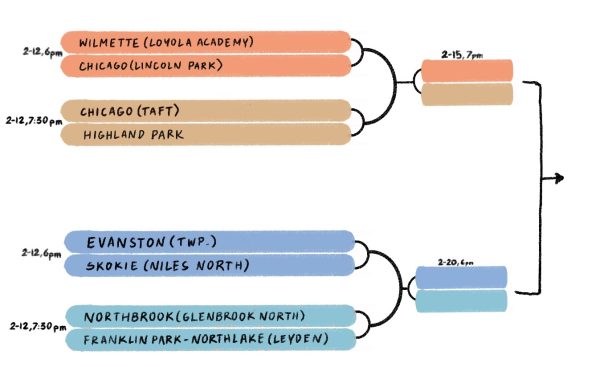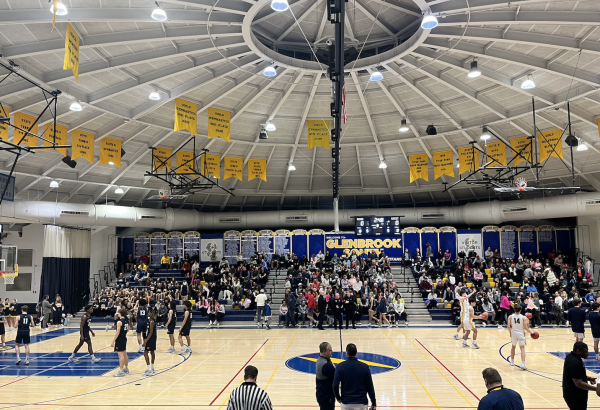Learning to lead: a spotlight on ETHS basketball’s student managers
January 31, 2020
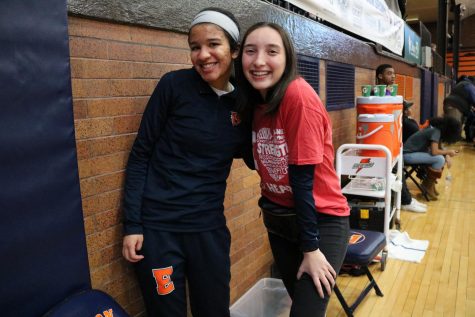
Erin Walker and Luci Lobin enjoy the game.
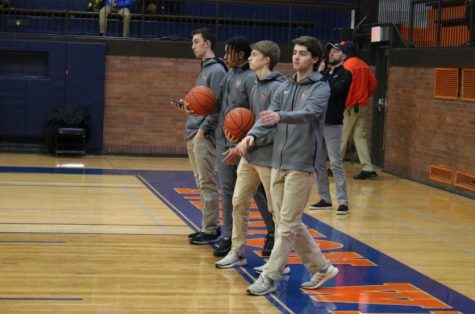
Dylan Casey, Jack Hart, Antonio Garcia and
Avi Shapiro help with warm ups.
In the shadows they lie. Keeping away from the spotlight of center court, they roam the sidelines looking to help in any way they can. They don’t do it for the glitz or the glamour; they do it because they are passionate. They care about their work and know that even if those in the stands don’t take notice, they’re making a difference. They are the key gear in a well-oiled machine–essential to an operation even if it doesn’t appear that way to the naked eye. They are the ETHS student managers, and they are the secret heroes of Evanston athletics.
With the consistent run of success for Wildkit basketball this season, many are quick to push all the responsibility towards players and coaches. After all, they are the ones putting up stats, calling plays and yelling from the sidelines. However, the ones ensuring that players can focus on their games and coaches on their schemes are the student managers, taking care of the tasks many forget about.
“Our managers are the real MVPs,” head boys basketball coach Mike Ellis explained. “I don’t know if it gets anymore unselfish and as a coach, that’s one of the traits we want our players to exhibit, looking at others before yourself.”
The responsibilities of managers vary by sport, but in terms of basketball, they mainly are the ones to keep practices and locker rooms organized and track stats during practices and games.
Aside from keeping the team sharp, a main aspect of their responsibilities is to keep track of opposing teams. Getting film from opponents helps the managers create scouting profiles on their competitors to determine which players or plays are vital to look out for. The managers also create scouting reports for Evanston to help players watch their own film and learn from it. The managers create portfolios of individual stats for players and share that with the team when requested.
“We all have different jobs,” junior Dylan Casey, a student manager since his freshman year, said. “Me personally, I help with [organizing] shooting shirts, water, keeping everything good on the bench and sometimes film if someone misses.”
Many managers choose to begin their career due to an interest in coaching. For Dantea Johnson (class of 2018), his path from student manager at ETHS to his current job working for Loyola University’s basketball team started from his cousin, assistant coach Necus Mayne, suggesting he work as a manager for basketball rather than take part in wrestling or track.
The act of becoming a student manager taught Johnson the ins and outs of the game while also helping him develop as a student and as a person.
“I was a bright mind, but I wasn’t a great student in any regard. Having coaches in my ear telling me, ‘You gotta do this and you gotta do this,’ really kept me on track,” Johnson said. “I got the same support the student athletes got and had so many people supportive of me.”
Johnson started managing his sophomore year and began in a small role, mainly passing out waters and doing other small tasks. But as he grew older, he quickly gained more responsibility before finally transitioning to a coaching role his senior season.
Despite early doubts by many about his decision, Johnson knew that sticking with managing could provide him with a bright future.
“At first, my friends were questioning me, but then later on they realized how beneficial it was,” Johnson explained. “I had to learn how beneficial it could be for me too. Going from passing out waters one day then going to taking pictures with Tom Izzo shows that there are benefits to it.”
Because of his work at ETHS, Johnson had the opportunity to continue managing in college, visiting with legendary college basketball coaches such as Mark Few, Izzo and Rick Pitino, before joining Bob Huggins at West Virginia and ultimately landing at
Loyola.
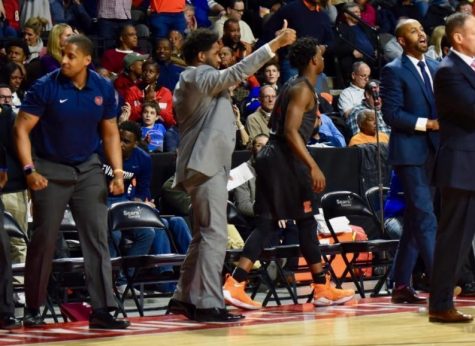
Dantea Johnson gives a thumbs up.
Once he came back to the Evanston area, it was a no-brainer to return back to the place that got his career started.
“That’s why I come back and that’s why I’m invested, because [being a student manager] has done a lot for me. If I can help because I have the time, I’m going to help and make sure I can help us remain a top-tier program and that we get back to state,” Johnson explained.
Managers don’t often receive the recognition they deserve from fans, but that does not mean their actions aren’t vital. Players and coaches, including junior Isaiah Holden, show high gratitude towards their managers.
“I think that the managers are one of the main reasons we’re doing so well,” Holden said. “Without them, I don’t know where we would be.”
Like Holden, star girls basketball senior Kayla Henning doesn’t take this selfless dedication for granted.
“We’re in high school and everyone is self independent, so for them to come out and volunteer to help us is amazing,” Henning said.
Holden goes into further detail, explaining that in certain cases, the managers take the responsibility of a coach in order to make sure players are focused. Keeping an entire team on track through- out practice is difficult to say the least, but the managers
have proven to be up for the task. Aside from convincing the team to work, managers have a lot on their plate. They often pick up the slack and do smaller jobs that the coaches cannot always put emphasis on.
“A lot of the times, the negative things that happen on the court are an effect of things that are off of the court. The student managers we have help eliminate a lot of that,” Henning explained.
Even with on-court performance, Henning recalls a time in which the managers were able to help her improve.
“I remember one year, my free throw percentage was horrible. Everyday after practice, student managers helped rebound free throws for me, and that was one of the reasons my percentage went up,” Henning said.
Student managers know their work isn’t always noticed by the naked eye, but they know it’s necessary to the team and can lead to success further down the line.
“I’m one of the few who found managing, and understood that that was a door that could be opened,” junior Luci Lobin explained. “It’s the perfect skill-based place for kids, especially freshmen who are trying to figure out their place.”
A student manager role will help not only develop one’s understanding of the sport, but improve one’s ability to coach and lead.
“You have to realize what you’re doing is bigger than you,” Johnson said. “You’re gonna get something out of it.”
Boys basketball managers: Juniors Dylan Casey, Antonio Garcia, Jack Hart, George Pareti, Avi Shapira, Kamran Stringer
Girls basketball managers: Juniors Kamille Kennedy, Luci Lobin and senior Erin Walker


